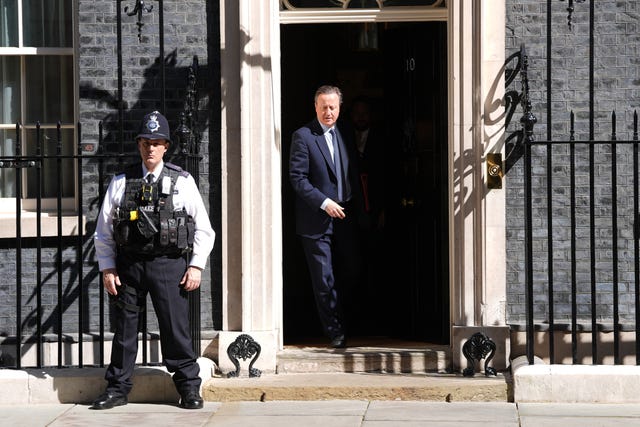
Ian Payne 4am - 7am
2 May 2024, 00:04

Messenger apps should blocked on official devices if strengthened transparency measures do not ‘command public confidence’, MPs have said.
Lobbying of Government ministers by WhatsApp should be subject to the same transparency as face-to-face meetings, a committee of MPs has said.
But messenger apps and other non-corporate communication channels (NCCCs) should be blocked on official devices if strengthened transparency measures do not “command public confidence”, the Public Administration and Constitutional Affairs Committee (PACAC) also said.
The committee launched a report into informal lobbying in the wake of the Greensill scandal, which saw Foreign Secretary Lord Cameron – who was a private citizen at the time – involved in an effort by the firm to secure access to an emergency coronavirus loan scheme.
The period prompted a widespread look at lobbying in Westminster, and saw strong criticism of Lord Cameron’s judgment.

In its report, the cross-party group of MPs has said: “If WhatsApp and other non-corporate communication channels are to be used in Government and, in particular, if they are to be used to communicate with third parties, then they should be subject to the same disclosure regime as other forms of contact.
“Where exchanges by means of NCCCs are in place of a face-to-face meeting or prompt significant consideration in Government, they warrant inclusion in the Government transparency releases.
“If an appropriate transparency regime cannot be found that can command public confidence, which we consider the current arrangements do not, the use of any NCCCs should be blocked on official devices.”
PACAC urged ministers to ensure transparency releases on lobbying of Government ministers and officials are released on a “more frequent and more comprehensive” basis to help build confidence in the system.
These logs are intended to disclose meetings, gifts, and hospitality, involving ministers and senior officials.
The records are currently released on a quarterly basis, with the committee recommending this should move to monthly reporting.
The committee raised the alarm that releases “are frequently late, have missing information, and often include too little information to be useful”.
The scope of the releases should also be wider it said, including lobbying of the special advisers employed by ministers and a “greater range” of officials.
A register of lobbyists was established by the Transparency of Lobbying, Non-Party Campaigning and Trade Union Administration Act 2014, aimed at ensuring transparency of such activities.
The committee recommended maintaining the current registry, rather than taking steps to bolster the law, but only if its concerns about transparency are dealt with.
“Despite calls for the Act to be extended to cover all lobbying activity, we recommend maintaining its limited focus on consultant lobbyists,” it said.
“Such calls, we conclude, are the product of frustration with the limitations of the Government’s quarterly transparency declarations.
“However, should these go unaddressed, the case for a register of all lobbying activity should be revisited.”
PACAC also recommended high profile opposition politicians should voluntarily disclose any meetings with lobbyists on the same basis as ministers do.
The acting chair of PACAC, Conservative former minister David Jones, said: “Lobbying in Whitehall is recognised as a key feature of our democracy, but the current legislation and transparency regime do not ensure that the public is fully informed about influences being brought to bear on policy formulation, across Government and non-government parties alike.
“We welcome the Government’s commitment to introduce a single, integrated platform for transparency disclosures and look forward to seeing this introduced as soon as possible, along with a move to more frequent publication of transparency releases.
“Increasingly, lobbying activity is undertaken on instant messaging channels such as WhatsApp and this is an area which we think needs greater transparency, to bring it in line with reporting of face-to-face meetings held with Ministers, in order to increase public confidence in the democratic process.”
A Government spokesperson said: “As you would expect, modern Government will use a variety of communication channels, but we have clear guidance in place on the use of electronic communications, including WhatsApp.
“We updated this guidance in March 2023 for WhatsApp, to reiterate that all relevant information must be recorded through official channels. Both the High Court and the Court of Appeal have been clear on the lawfulness of this approach.
“We also committed in our revised transparency guidance, published in December, to stricter standards to ensure transparency returns and publications contain relevant and instructive information.”